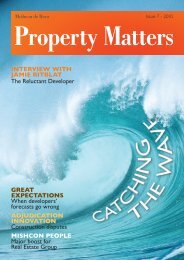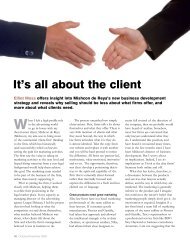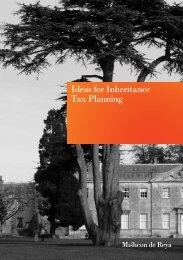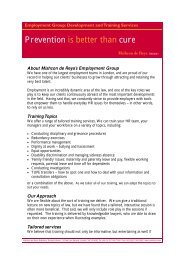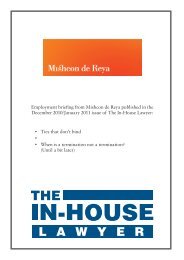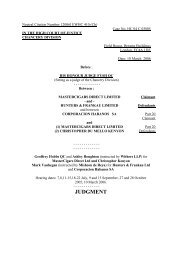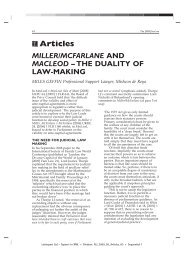Download PDF - Mishcon de Reya
Download PDF - Mishcon de Reya
Download PDF - Mishcon de Reya
- No tags were found...
You also want an ePaper? Increase the reach of your titles
YUMPU automatically turns print PDFs into web optimized ePapers that Google loves.
From west to eAstInterviews with Gary Yardleyand Jamie RitblatThe virtuous circlePrivate wealth withinthe corporate sphereLet there be lightThe ongoing battleover rights of lightIssue 92012PropertyMatters2012.•How networking powers businessThe Year of The Connected.
The property industry thrives on connections.From accessing the market and sourcing <strong>de</strong>als tosecuring investors and unlocking finance, it oftencomes down to who you know.Never has this knowledge been more importantthan in 2012: The Year of The Connected. Withthe Olympic Games focusing the world’s attentionon London, new opportunities for investment areopen to everyone.Overseas buyers now account for around half ofall investment into central London. As a firm, weare seeing a huge appetite from Asian and MiddleEastern investors in particular. These span boththe corporate and private wealth spheres, and wesee ourselves at the core of connectivity betweenthese two sectors. It is our un<strong>de</strong>rstanding of thisnexus between business and private client thatsets us apart from other firms.This year, <strong>Mishcon</strong> <strong>de</strong> <strong>Reya</strong> was named Law Firmof the Year and my <strong>de</strong>partment Real Estate Team ofthe Year at the 2012 Legal Business Awards, heldat the Grosvenor House Hotel in London. This wasa proud moment for us all and certainly somethingthat could not have been achieved without ourclients, friends and supporters. We truly value ourconnections with each of you.CONTENTSReal Deals 1what’s happening down your local? 2the virtuous circle 4Are you a fund manager? 6CONNECTING RECESSIONS 7west si<strong>de</strong> story: Gary Yardley 8east si<strong>de</strong> story: Jamie ritblat 9LET THERE BE LIGHT 10MISHCON PEOPLE 12PUBLICITY 14landaid: BATTLE OF THE GIANTS 16ANNUAL real estate PARTY 17Advising Capital & CountiesProperties PLC in relation to itsregeneration of Earls Court & WestKensington Opportunity Area inwest London. The plans proposethe transformation of the area intoSir Terry Farrell’s masterplan visionfor four new urban villages and a 21stcentury high street over the 77 acresite. They inclu<strong>de</strong> the creation of7,500 homes and 12,000 jobs aswell as commercial, community,cultural and open green space.Earls CourtA selection of <strong>de</strong>alsour Real Estate Departmenthave advised on over the last yearhomes with the potential for afurther 2,000 new homes.Olympic VillageActing for a new joint venturebetween GI Partners, RowanAsset Management and TaurusInvestment Holdings on its £82.7million acquisition of AldwychInvestments Limited, which ownsthe freehold of Aldwych House.The 163,000 sq ft office buildingis located in London’s Midtownoffice district.Advising a group of investors led bythe Matterhorn Palos Partnership,a JV between Matterhorn Capitaland Brett Palos Investments, ontheir £113.5 million acquisition ofthe Kings Mall Shopping Centre inHammersmith, west London. Theshopping centre, which comprises45 retail units, was purchased fromSt Martins Property Investments.Representing Allsop as LPA receiverson the £130 million sale of centralLondon’s 1.3 acre Piccadilly Estateto a Reuben investment vehicle,Al<strong>de</strong>rsgate Investments Limited.The historic estate comprises sixbuildings including the former siteof the In & Out Club.Nick DoffmanHead of Real Estatenick.doffman@mishcon.com+44 20 7440 7015Representing clients of Delancey andScottish Widows (formerly InvistaReal Estate Investment Management)on the £305 million sale of the RollsBuilding – their prime 265,000 sq ft<strong>de</strong>velopment at 110 Fetter Lane incentral London – to Legal & GeneralPensions Limited. The building ismajority let to HM Court Service.Acting for Delancey and Qatari Diaron the purchase and long-termmanagement of the Olympic Village.The Village, which lies adjacent tothe Olympic Park in Stratford, eastLondon, will <strong>de</strong>liver 2,818 newAdvising Londonewcastle on therestructure of their London portfolio,consisting of a number of resi<strong>de</strong>ntialled mixed use property assets witha <strong>de</strong>velopment value in excess of£350 million, in a JV with UK andEuropean Investments (UKEI), theinvestment vehicle of the LewisTrust Group. This also inclu<strong>de</strong>dLondonewcastle’s £100 millionretail and resi<strong>de</strong>ntial <strong>de</strong>velopmentblock on the Huntingdon Estate inShoreditch, east London.Former In & Out ClubActing for Cathedral Group plc andDevelopment Securities plc on theirjoint acquisition of the London Gatebusiness park in Hayes, Middlesex,from JER Partners, the BlackstoneGroup and Resolution. The JV, forwhom the Firm continues to act onthe project, has just unveiled a £250million re<strong>de</strong>velopment plan for the18 acre former EMI headquarters site.IMPORTANT: The information contained in this publication is only inten<strong>de</strong>d as a general summary and no action should be taken in reliance on it without legal advice. © 2011 <strong>Mishcon</strong> <strong>de</strong> <strong>Reya</strong>1
What’shappeningdown yourlocal?The Localism Act brings the concept of“neighbourhoods” into the very heart ofthe planning system. Developers have beenwell used to <strong>de</strong>aling with Boroughs andDistricts as their local planning authorityand sometimes treating immediateneighbours as little more than a nuisance.Even though the reforms in the Act arenot as extreme as might have been fearedby the initial rhetoric, there is the potentialfor small groups of people to have a stronginfluence on how their neighbourhood is<strong>de</strong>veloped in the future.However, the Act also creates opportunitiesfor businesses to become active participantsin the planning of the predominant newbusiness-oriented neighbourhoods. Thiscould inclu<strong>de</strong> business parks or industrialestates as well as small town centres or highstreets; a point which could usefully havebeen championed more strongly by MaryPortas in her ‘Review of the High Street’.The Community Right to Bid, however, isa threat to liquidity for landowners. Localgroups can <strong>de</strong>signate assets as being ofactual or possible community value, be itthe last pub or shop in the village or abuilding which is ripe for conversion to afree school. Sales of <strong>de</strong>signated assets canbe <strong>de</strong>layed while communities look toput together a bid, even though there isno requirement on the landowner to sell.Who is my neighbour?Much like the Local Enterprise Partnerships,which replaced the regional bodies, neighbourhoodsare expected to be createdfrom the “ground up”. Groups who thinkthey represent an area can ask the LocalAuthority for recognition of their area asa neighbourhood and the body itself asthe appropriate neighbourhood authority.That group can be as small as 21 peoplewho meet in the local pub.The best indication we have of the size of aneighbourhood is that parish councils automaticallyqualify to be the neighbourhoodfor their area. Quite how a rural civil parishtranslates to the streets of Westminster orWigan is something which will be testedover time.What powers does a neighbourhood have?The neighbourhood’s first power is to preparea neighbourhood plan. A neighbourhoodshould not <strong>de</strong>part significantly from theallocations in the local <strong>de</strong>velopment frameworkbut neighbourhood forums do appearto have some control in directing <strong>de</strong>velopmentto the most appropriate areas. Inreality, however, given the various constraintsin terms of land ownerships, greenbelts andother <strong>de</strong>stinations this apparent freedomwill be quite restricted.Where a plan has been adopted, neighbourhood<strong>de</strong>velopment or<strong>de</strong>rs can bepromoted by the forum to grant directpermission for forms of <strong>de</strong>velopment.Finally, the Community Infrastructure Levyis likely to have a top slice diverted directlyto neighbourhoods for spending on localinfrastructure. The possibility to pool thiswith perhaps a Business ImprovementDistrict has the potential to really focuson local placemaking.What does this mean?When looking to promote <strong>de</strong>velopment,one of the first steps must be to ascertainwhether a neighbourhood forum is alreadyin place or whether there are moves tocreate one. We are already advising clientson early engagement with such bodies toascertain the key local priorities to informplanning obligation negotiations with thecouncil.For property investors, the Act bringsopportunities to forge greater links withtheir immediate local area. Whether or nota business-led neighbourhood forum can becreated, there are still opportunities tobecome involved. Landowners should becareful not to be seen to “buy” neighbourhoods,but businesses may well be ableto bring expertise, meeting space oradministrative support that the forumcannot achieve for itself.Connecting with people is now moreimportant than ever before in the planningregime. The Localism Act is another remin<strong>de</strong>rthat planning is more than a simple matterof architecture and landscaping.Daniel FarrandHead of Planning and EnvironmentEmail: daniel.farrand@mishcon.comTelephone: +44 207 440 47643
Lipman: I’ve seen our practice change through the growing influx ofoverseas wealth into UK real estate. In addition to property companies andfunds, many of our clients are now overseas private individuals andfamily offices investing in UK real estate for the first time. With Londonregar<strong>de</strong>d as a safe haven from market turbulence elsewhere, we continueto see a flow of new money from other jurisdictions and with the‘‘Daniel introduction this year of a new tax relief for non-doms I canonly see this continuing. In particular, there’s been anexponential increase in investment from Russia, theMiddle East and the Far East into Central Londoncommercial real estate, largely offices and hotels.James Wilcox: From a private client perspective,there’s been a change in attitu<strong>de</strong>s and perceptionssince the 2008 financial meltdown.High net worth families are no longerprepared to place their complete trust inbanks, and in<strong>de</strong>ed many families areeven more cautious regarding assetpreservation. Many have looked atsetting up their own private familyoffices or have sought advice frommulti-family offices, who can offer adiscreet platform through whichthey can monitor and control theirwealth. Separately, but as part ofthis changing financial landscape,sovereign funds and family officesnow play a greater role in lookingfor investments. Cash in the bankcannot provi<strong>de</strong> a complete solutionto asset protection so the familiesare looking for alternative investments,and are providing muchnee<strong>de</strong>d sources of equity in variousareas of private and public businesses.Ned El-Imad: Yes, international privatewealth remains huge. Shrewd, cash-richinvestors are opting for prime Londonreal estate rather than leaving their moneyin the bank. Throw in favourable exchangerates and the UK property market isparticularly attractive to overseas players.With this in mind, mo<strong>de</strong>rn day lawyers alsoneed to be connectors and facilitators. I see thisall the time in resi<strong>de</strong>ntial real estate. You’re oncall and it’s not enough to be “just a lawyer” – youhave to prove yourself as a trusted advisor. Investors needtrusted professional advisers who un<strong>de</strong>rstand the intricaciesof the UK resi<strong>de</strong>ntial property market and can help to create an<strong>de</strong>xtract value.to be proactive in making those useful introductions and connections. Since we’re in aposition of trust, it’s important that we effect introductions to property companies,banks, agents and other professionals that we know will provi<strong>de</strong> a first classservice. It’s a virtuous circle, as work tends to flow both ways with thebanks and professionals we have a relationship with. If they provi<strong>de</strong> agreat service to clients, we’ll send more work.he virtuous circleIan Paul: Absolutely. And useful connections are vitally important to our overseasclients as their networks lie in other jurisdictions. They’re relying on us, at least initially,Susan Freeman: Clients also respond to creativity in the waythat law firms approach the relationship. Our partnershipwith Quintessentially, the luxury lifestyle group, enablesus to offer a 24-hour, 365 days a year, global conciergeservice to our clients – an example of how a lawfirm’s client relationships can extend beyondthat of a traditional legal advisor.2 3 54TMaking connectionsNick Minkoff: But clients aren’t just interestedin who we can introduce themto externally; it’s equally importantknowing how different parts of yourown business can work in concertto achieve the client’s ultimate goals.Lawyers can become siloed withintheir own area of expertise, butit’s imperative that firms breakdown internal barriers so that<strong>de</strong>partments and teams knowhow they support or influenceother areas of their firm. OurPrivate Client lawyers all workclosely with our Real EstateDepartment and other commercialteams.Kamal Rahman: As Head of ourImmigration Group, it is vitallyimportant to me that there’scomplete synergy between realestate and immigration. For highnet worth clients who are relocating,London is their “Plan B” to safeguardtheir families against the geopoliticalturmoil in their own countries. The twopillars of Plan B are UK resi<strong>de</strong>ncy and UK realestate. We use our network to assist, so forinstance where a family is relocating we workclosely with school consultants.‘‘Nick Doffman: What it really comes down to is trust andrapport. Ability to service a client’s professional work is agiven; if we <strong>de</strong>monstrate to our clients that we really care abouttheir business and will play our part to enhance that business (throughour connections) they will trust us, which in turn cements our relationship.Providing quality legal services remains essential but fora law firm to thrive it must give real ad<strong>de</strong>d value to its clients andintermediaries. At <strong>Mishcon</strong>, we achieve this through our own connectivity!
Q. When isa <strong>de</strong>velopernot a <strong>de</strong>veloper?A. When they’re afund manager.ConnectingRecessionsWe’re in the most serious downturn since the 1930s. How does this compare to the lastrecession in the 1990s?We are seeing some book sales and receiverships now, but not as much as I would expect.Overall inertia seems to be the overriding theme.It’s much worse. The early 1990s downturn was characterised by a property market collapsebut the banks still had strong balance sheets and they enforced more readily. This time, thebanks are in distress, don’t necessarily want to crystallise losses and are keeping assets on thebooks by pushing out maturity dates.People have been in <strong>de</strong>nial and have taken time <strong>de</strong>ciding what to do. The problem is bigger thistime. Since the last recession, we’ve seen the explosion of securitisation driven by banks moreconcerned with volume of <strong>de</strong>als than quality of assets. Also, lower interest rates have helpedbanks to carry loans this time.Banks are not really going for joint venture opportunities or for getting in new money by wayof staple financing. How about in the previous downturn?In the 1990s, banks ten<strong>de</strong>d to crystallise losses and move on. We saw banks agreeing to holdoff enforcement in exchange for success fees when the market recovered. Now, by pushingout maturity dates and increasing pricing, they are simply kicking the problem down the road.Profit sharing may be a more sensible option. The market is evolving though. We are startingto see banks off-loading distressed portfolios at big discounts to private equity houses and others.Funding is available on prime quality assets but who will fund the other <strong>de</strong>als? New playerssuch as private funds and insurance funds only appear to be lending on prime assets. If theylowered their sights to secondary assets, maybe they could become the “white knight”.Are you a fund manager?That should be an easy question to answer.However for an increasing number ofproperty <strong>de</strong>velopers and buil<strong>de</strong>rs, theanswer is actually “quite possibly”.At a time when financing is hard to comeby, many <strong>de</strong>velopers have looked at thepossibility of involving investors – both UKand international – in projects with the aimthat all involved are equity participants. Thisseems to be a reasonable and entrepreneurialresponse to the economic situation,and far removed from the <strong>de</strong>rivative-related,complex financial instrument market whichexcited lawmakers into regulating the fundsarena in the first place.However, the regulators have set their sightson the property industry, and the FSA hasma<strong>de</strong> it clear they intend to crack the whipas they enforce the rules vigorously. TheFinancial Services and Markets Act 2000,which would appear to have little to dowith property <strong>de</strong>velopment, manages tocatch the sector with the <strong>de</strong>finition ofCollective Investment Schemes (CIS).What is a Collective Investment Scheme?This covers any arrangement with respectto property of any <strong>de</strong>scription which enablethose taking part to receive income orprofits arising from the acquisition, holding,management or disposal of the property.If the participants are not involved in theday to day management, it is likely to bea CIS. As a result, such schemes can ariseinadvertently where <strong>de</strong>velopers regard itas simply a profit-sharing arrangement orco-investment opportunity.As a CIS, there are restrictions as to whomthe scheme can be promoted, and requirementswith regard to the operator. In essence,an FSA-authorised entity is generally nee<strong>de</strong>dto act as the operator. In addition, marketingcan usually take place only to professionalinvestors or to those who can certify theirincome at over £100,000 or net assets over£250,000.Crossing either of these lines may well attractthe attention of the FSA’s enforcementdivision, particularly if any investor isdisgruntled at the outcome of his investmentand chooses to complain to them. Forexample, in 2008 the FSA asked the HighCourt to wind up UKLI Limited, the UK’slargest land-banking company, on the basisthat it was operating a CIS when it was notauthorised to do so.Given the increasing propensity of the FSAto look for draconian sanctions wheneverpossible, including hefty fines, this is an areathat anyone who is sharing the profits ina <strong>de</strong>al will have to address before eveninviting investors to part with their money.What can be done?Your legal advisor may have structuresand forms of agreement that can helpavoid many of the potential pitfalls. Withour Funds and Financial Services Teamand Real Estate Department’s in-houseoffshore legal expertise, particularly withregard to the BVI but also other reputablelocations, we can help to minimise therequirements, and tie them in with taxefficientstructures which will work forinvestors from most parts of the world.We are seeing a growing trend for property<strong>de</strong>velopment and investment companieslooking to address the issue by obtainingFSA authorisation. This was almost unheardof until relatively recently, but we are nowhelping a number of clients through theprocess. Although there are ongoingobligations, they tend not to be as onerousas many believe. Talk to your advisors aboutthe pros and cons to see if FSA authorisationis worth consi<strong>de</strong>ring for your business.Gray SmithHead of Asset Managementand Investment Fundsgray.smith@mishcon.com+44 207 406 6083The million pound question is where the money to fund the <strong>de</strong>als that need refinancing willcome from?2011 was an interesting year. The sense of cautious optimism at the start gave way touncertainty with the <strong>de</strong>epening Eurozone <strong>de</strong>bt crisis.There is a sense that this time the banks have been tarnished by the liquidity crisis and thatborrowers are more empowered.Borrowers now have to think strategically in or<strong>de</strong>r to persua<strong>de</strong> banks that a solution may beto warehouse a <strong>de</strong>al, bringing in more equity, new sharehol<strong>de</strong>rs and so on.Nick StruttHead of Real Estate FinanceEmail: nick.strutt@mishcon.comTelephone: +44 207 440 7165There has been talk of the insurance companies coming in but they will need to <strong>de</strong>velop originationplatforms. If they set their sights lower to secondary property they could be a “white knight”.Some banks are suffering less but they’ve still stopped property lending. We are seeing somenew money through boutique finance houses but it’s expensive. And there’s some positivityin terms of new len<strong>de</strong>rs – funds, mezzanine len<strong>de</strong>rs or even bigger entrants to the market.It isn’t clear how the enormous wall of <strong>de</strong>bt is going to be refinanced but some sophisticatedborrowers have refinanced early to avoid being wrong-footed.This recession is about time. It’s a waiting game. Whether looking at the Eurozone <strong>de</strong>bt or thebank liquidity crisis, we can only resolve the problem when the value of <strong>de</strong>bt relative to assetsreduces. Unless banks write off <strong>de</strong>bt, this won’t be resolved without growth or inflation.In the 1990s, banks were powerful, untouchable institutions. Back then, if you had asked forprotection against a bank in a loan document you’d have been laughed out of town. We haveseen a complete change of attitu<strong>de</strong>.Yes. Twenty years ago, banks were largely represented by magic circle firms and borrowersby commercial lawyers with little banking experience. Now it’s more of a level playing field.We have to come up with novel ways to restructure financing as well as creative approachesto the difficulties that arise from distressed assets. For example, borrowers often have interestrate hedging. In case of <strong>de</strong>fault the hedging is closed out, which can lead to significant costs.However, techniques to mitigate costs may be available. The key is always to seek advice early.Michael Bar<strong>de</strong>llPartner, CorporateEmail: michael.bar<strong>de</strong>ll@mishcon.comTelephone: +44 207 406 62246 7
WEST SIDESTORYroyal Borough of kensington and chelsealondon borough of hammersmith & FulhamGary Yardley talks to Susan Freeman about Capco’sregeneration of Earls Court in west LondonThe Olympic volleyball tournament will behosted at Earls Court Exhibition Centre,with other events taking place at Olympia’s90,000 sq ft West Hall, newly built toprovi<strong>de</strong> additional, user friendly exhibitionspace. Gary Yardley, Director of Capital& Counties (Capco), points out that “thewhole of Earls Court Exhibition Centres1 and 2 will be taken over for the entireperiod of the Games”. However, it is onlypost-Olympics that Capco’s exciting plansfor Earls Court really start to move ahead.Following nearly two years of consultation,outline planning applications were submittedin June to the two local authorities,Hammersmith & Fulham and Kensington& Chelsea, for the Earls Court & WestKensington Opportunity Area (ECOA).These aim to transform this 77 acre westLondon site into a vibrant new district.Terry Farrell’s masterplan is based on theconcept of “Four new Urban Villages anda 21st century high street” which inclu<strong>de</strong>s7,500 homes, 2 million sq ft of commercialand retail space along with 23 acres of openspace and a five acre ‘Lost River Park’ project.There will be public transport improvementsand initiatives, and it is thought that 12,000permanent new jobs will be created.Hammersmith & Fulham Council haveresolved to grant <strong>de</strong>tailed planningpermission for the re<strong>de</strong>velopment ofthe 7.4 acre Seagrave Road car park site.Currently serving Earls Court ExhibitionCentre, this will form part of the proposedWest Brompton village. Capco have teamedup with the wealthy Kwok Family Interestsfor a 50:50 joint venture. The Kwok FamilyInterests are major sharehol<strong>de</strong>rs of SunHung Kai Properties Limited, one of thelargest real estate companies listed onthe Hong Kong Stock Exchange.Yardley regards this alliance as “a massivecoup” as this is the Kwok Family Interests’first large scale corporate joint venture inLondon. Capco sought out a top <strong>de</strong>veloperable to provi<strong>de</strong> the requisite high qualityto set a new benchmark for the area.For Yardley, a key difference between EarlsCourt and the Stratford Olympic <strong>de</strong>velopmentis that east London had “a clean canvas”whereas at Earls Court they can use thebest of west London to influence the <strong>de</strong>velopment’s<strong>de</strong>sign. As Yardley comments:“What people like about Terry Farrell’svision is that, in many ways, it is what wouldhave happened in the 1800s if the areahad not become an exhibition playground.A site like this is a rare commodity. It canhelp fulfil the need for new housing.” Thescheme has been mo<strong>de</strong>lled over 20 yearsbut this period can be spee<strong>de</strong>d up orslowed down as required.The project will create London’s first newhigh street in 100 years, connecting NorthEnd Road in the west with Earls CourtStation to the east.Significant retail aimed at in<strong>de</strong>pen<strong>de</strong>ntshops, bars, cafes and restaurants will beinterspersed with community uses. It willbe “the social hub of the district, a place foreverybody”. In addition to multiple publictransport links, there will be substantialcar parking and the Boris bike scheme willbe exten<strong>de</strong>d westwards with thousandsof bike ports. Capco are even consi<strong>de</strong>ringa new market initiative similar to CoventGar<strong>de</strong>n, which will be music to MaryPortas’ ears.EAST SIDESTORYLondon Borough of NewhamJamie Ritblat discusses Delancey’s joint ventureinvestment in the Olympic Village in east LondonOnce the 17,000 athletes have vacated theOlympic Village – now renamed East Village– works will begin to retrofit the units. Thesewill then be han<strong>de</strong>d over to Delancey andtheir Qatari joint venture partners as 1,439fully fitted new homes. It is expected thatin winter 2013, resi<strong>de</strong>nts will move into acompleted community boasting a stateof-the-artaca<strong>de</strong>my, medical centre andcommunity facilities. As Delancey CEOJamie Ritblat puts it, “It is important toremember that the legacy has driven the<strong>de</strong>sign brief, and not the other way around– the buildings were created with a visionfor a long-term resi<strong>de</strong>ntial neighbourhood,for a time beyond the Games.”Having enjoyed one of the last tours prelockdown,I can confirm that the Village hasa real “wow” factor. The size of St James’sPark, the <strong>de</strong>velopment sits amidst lushlandscaping and parkland, and is an integralpart of the Stratford regeneration storythat will serve as a lasting legacy long afterthe Olympic torch has moved on.The Stratford Regeneration Partnership hassuccessfully brought the Stratford projecttogether on budget and on time. Ritblatremarks on the “collegiate and cooperative”attitu<strong>de</strong> which has prevailed between thevarious <strong>de</strong>velopers and the “strong will toensure the area is brought together in acohesive and effective way”.The East Village will have a high proportionof rental accommodation, which Ritblatregards as part of a prece<strong>de</strong>nt which isalready in train. “Home ownership has beenin <strong>de</strong>cline for 10 years and there is noobvious reason why this is likely to change.”He has seen a shift in sentiment affecting bothyoung and old alike, but for him the key ismaking the mo<strong>de</strong>l work so that resi<strong>de</strong>ntiallandlords get a reasonable return on cashflow. There is “a disconnect” between rentalincome and capital value. The constraintis the limited availability of suitable property.He comments: “To get resi<strong>de</strong>ntial managementright, you need scale and mass as theproperty can’t be disparate. You can’t makeit work with hundreds of properties spreadacross London.”The benefit of a large site such as the Villageis that it enables the landlord to control suchelements as security, retail offer and childcare. “It’s changing but historically it’s beendifficult to achieve in London. Legislationwas for a long time anti-landlord and therehas been a reluctance to grasp the nettleagain.” He views the East Village as “thefirst great opportunity on this scale”.A catalyst is certainly nee<strong>de</strong>d to createinstitutional interest in the resi<strong>de</strong>ntial rentedsector. Ritblat acknowledges that “all eyeswill be on us to do it”. He clearly relishes thechallenge and is enjoying the excitementof creating a new community from astanding start.If “economic prosperity is about confi<strong>de</strong>nce”,the upcoming Olympics and the Queen’sDiamond Jubilee should engen<strong>de</strong>renthusiasm and positivity to take us wellinto next year.Susan FreemanReal Estate Partnersusan.freeman@mishcon.com+44 20 7440 70178 8 99
<strong>Mishcon</strong>peopleRichard AnyamenePartner, Property LitigationRichard regularly <strong>de</strong>als with disputes relatingto strategic property management forcommercial and institutional landlordsand tenants, and advises <strong>de</strong>velopers oncontentious issues around <strong>de</strong>velopmentschemes. Having managed cases at all courtlevels, he is experienced in conductingsubstantial one-off litigation in relation tocommercial and resi<strong>de</strong>ntial property disputes.He also has expertise in insolvency-relatedand professional negligence matters.Richard was previously Head of PropertyLitigation at Jones Day.Michael Bar<strong>de</strong>llPartner, CorporateWith more than 25 years’ experience, Michaeladvises banks, investment fund managers,private equity houses and substantialcorporations in relation to a broad range of<strong>de</strong>bt finance transactions, with an emphasison property lending as well as acquisition,leveraged, structured and general corporatefinancing. He was previously a Partner atTravers Smith LLP.Gray SmithPartner, Head of Asset Managementand Investment FundsGray has over 20 years’ experience in the legaland regulatory aspects of both onshore andoffshore funds and asset management, includingthe establishment of hedge, private equityand property funds. He advises on regulatedproducts including UCITS offerings, as wellas the establishment of management entitiesboth in the UK and elsewhere. He alsoadvises management teams on regulatoryand structuring matters. Gray is also qualifiedin the British Virgin Islands and CaymanIslands. He joined the Firm from Appleby.Kassim MeghjeePartner, TaxKassim advises UK and international clientsin relation to the taxation of business andinvestment activities. He has experiencewith structuring the tax-efficient acquisition,ownership and disposal of shares, securitiesand real estate, the interpretation of doubletaxation treaties and the application oftransfer pricing rules. He advises a numberof UK, European and Asian-basedbusinesses and their owners, as well asUS-based multinationals. Kassim waspreviously a Tax Partner at Steptoe andJohnson LLP.Wesley FongenieConsultant, PlanningWesley has extensive experience in providingstrategic advice on major <strong>de</strong>velopments,including advising and negotiating on largeinfrastructure agreements. His expertisealso encompasses public inquiry work,both at appeal and in promoting schemesvia the local plan, as well as High Courtand judicial review actions. He joined theFirm from Nabarro LLP, where he was aPartner in the Planning Group.Selwyn TashConsultantSelwyn advises public companies,institutional len<strong>de</strong>rs and high net worthindividuals within the real estate andcommercial sectors. Since 2001, he hasbeen the Club lawyer for TottenhamHotspur Football Club, acting on matterssuch as property acquisitions and disposals,as well as the construction of a newTottenham stadium and regenerationof the surrounding area.Claire ManchesAssociate, Real EstateHaving previously worked as an in-houselawyer at Amazon, Claire has expertisein <strong>de</strong>aling with acquisitions and disposalsinvolving private companies, unit trusts,partnership interests and joint ventures,as well as straightforward asset sales. Sheis also experienced in asset managementagreements, leasing and management work,and project managing large due diligenceexercises in cross bor<strong>de</strong>r transactions.Ros CookSolicitor, Property LitigationPrimarily advising commercial landlordsand tenants, Ros also has wi<strong>de</strong>r experiencewithin the resi<strong>de</strong>ntial property sphere.She has expertise in a range of landlordand tenant matters such as dilapidations,lease renewals, rent arrears recovery,possession claims, forfeiture and rent review.She also advises landlords and insolvencypractitioners in insolvency situations. Rosjoined from Pinsent Masons LLP.Claudia EmersonSolicitor, Real EstateClaudia has transactional experience in allaspects of commercial real estate includinginvestment sales and acquisitions, <strong>de</strong>velopmentwork and landlord and tenant matters.She has also provi<strong>de</strong>d real estate supportfor corporate and finance-led transactions.Her clients range from pension funds andbanks to private investors, <strong>de</strong>velopers andproperty companies. Claudia was previouslyat Olswang LLP.Rebecca TaylorSolicitor, Real EstateRebecca has a range of experience includingacquisitions and disposals of investmentand retail properties, as well as propertymanagement experience relating tolandlord and tenant work on behalf ofa major listed property REIT. She alsohas experience in real estate supportfor financing and corporate transactions.Before joining the Firm, Rebecca was anAssociate at Slaughter & May.Firyal TeemulSolicitor, Real Estate FinanceFiryal, who joined from Pinsent Masons LLP,has experience of working on a numberof syndicated and bilateral lending <strong>de</strong>als,particularly in the area of property finance.She has completed seats in both propertyand banking and has a significant amountof transactional experience working for arange of clients in both areas.Vasoula TelevantosSolicitor, Resi<strong>de</strong>ntial PropertyVasoula has experience in a range ofresi<strong>de</strong>ntial property matters, with anemphasis on prime central Londonacquisitions, disposals and lease extensions.Her clients, mainly high net worthindividuals but also <strong>de</strong>velopers and <strong>de</strong>alers,come from all over the world includingthe Far East, the Middle East and Europe.She is fluent in Greek. Vasoula waspreviously at Howard Kennedy.1213



